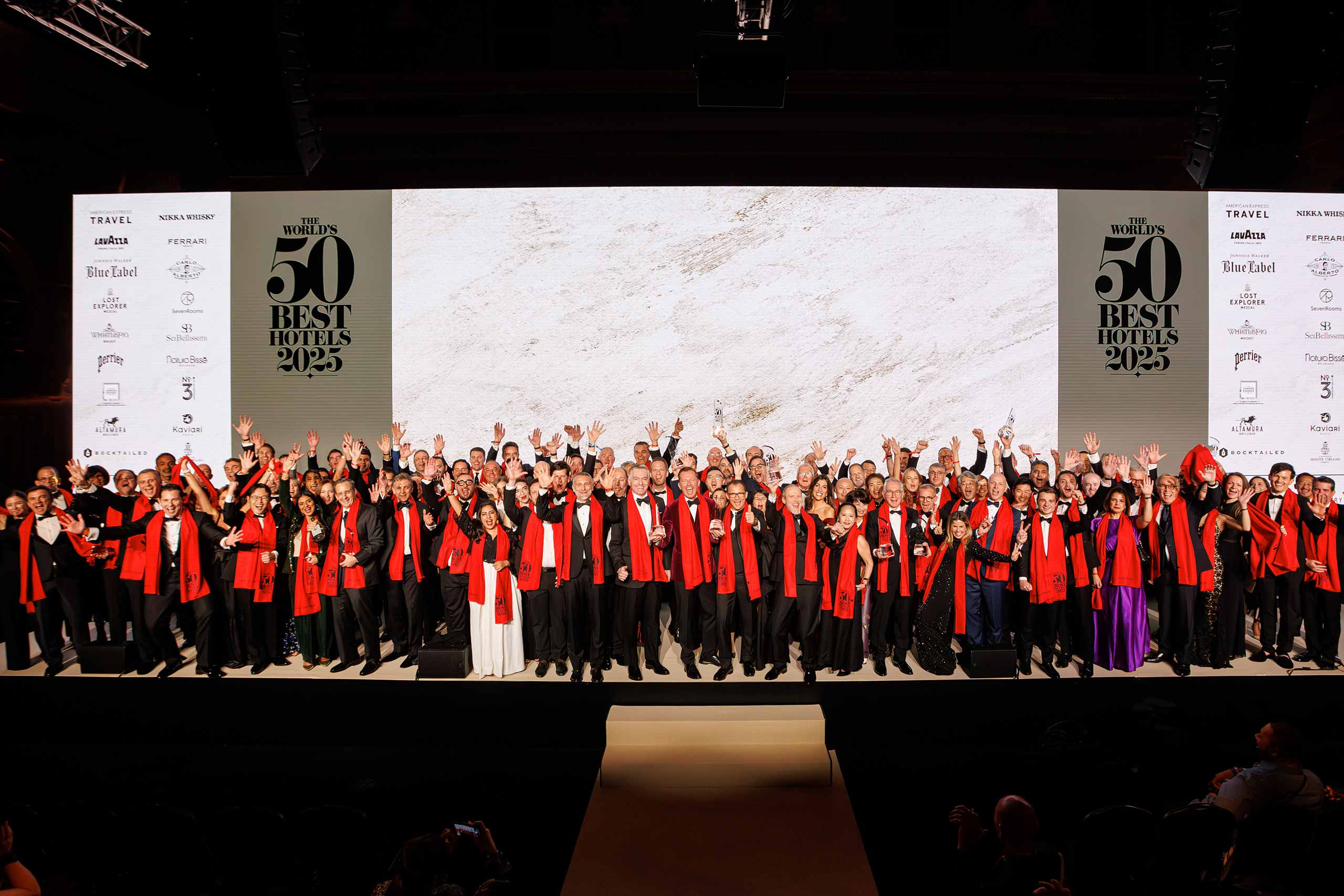Perhaps the most glamorous affair in the history of London’s Old Billingsgate, a 17th-century fish market turned event venue, The World’s 50 Best Hotels 2025 was more black tie than blue fin. The same could be said – at first glance, anyway – for some of the winners, evermore luxurious places to stay that don’t exactly trade in being down-to-earth. But a closer look reveals that what really sets them apart isn’t the shiny chandeliers. It’s something else entirely.
It was unsurprising to see some of our favourite hotels and resorts rank among The World’s 50 Best Hotels 2025. The usual suspects won big: Rosewood (#1 for Rosewood Hong Kong, #23 for Hôtel de Crillon, #24 for Rosewood Sāo Paulo, #44 for Las Ventanas al Paraíso), Four Seasons (#2 for Four Seasons Bangkok at Chao Phraya River, #9 for Four Seasons Firenze, #17 for Four Seasons Astir Palace), Mandarin Oriental (#7 for Mandarin Oriental Bangkok, #14 for Mandarin Oriental Qianmen, #41 for Mandarin Oriental Hong Kong) and others had reason to celebrate while Aman fell suspiciously behind with a single hotel on the list, Aman Tokyo at #25, and Cheval Blanc saw just one of its chic properties, Cheval Blanc Paris, recognised (having fallen from #4 last year to #21 in 2025).
Alongside these, some of the world’s finest standalone and independent properties were honoured, including Lake Como’s Passalacqua, which came in at #4 and was the winner of hearts, noticeably receiving the loudest applause of any hotel in the top 10, or Bali’s Desa Potato Head, which secured the #18 spot. And, for the first time since its inaugural edition in 2023, the “50 Best” were actually the “100 Best”, with an extended list of the top 51-100 spots published just two weeks ago, in anticipation of the main event.
Well-deserved honours aside, even the world’s best hotels are only as attractive as the destinations they’re in. That’s because no hospitality endeavour is divorced from its surroundings. And when ecology or communities can’t thrive, neither can immersion in nature or service culture. On a recent podcast episode with the industry’s favourite Insta-obsession, Gstaad Guy, Rosewood President Radha Arora explained that the brand was about converting unique properties into “a destination where you want to stay, not a hotel”.
But when hotels seek to be everything but mere places to stay, it poses the question of just how relevant the nuts and bolts of hotels actually are: if we don’t rate them by their thread counts and iPad-controlled blackout curtains, what are the criteria that separate the “good” from the “Best”?
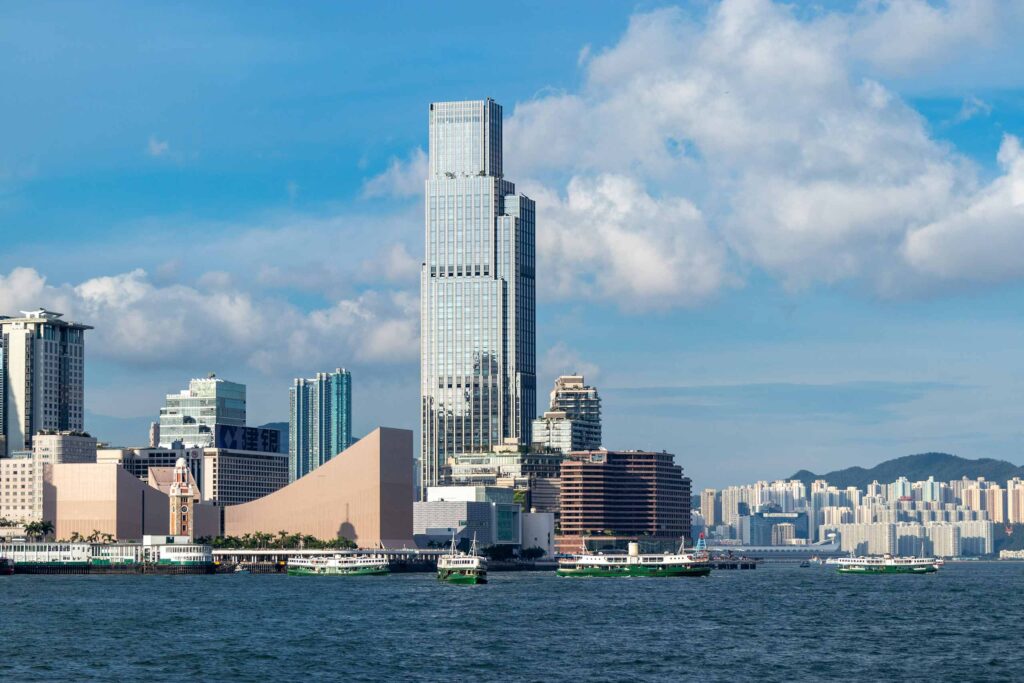
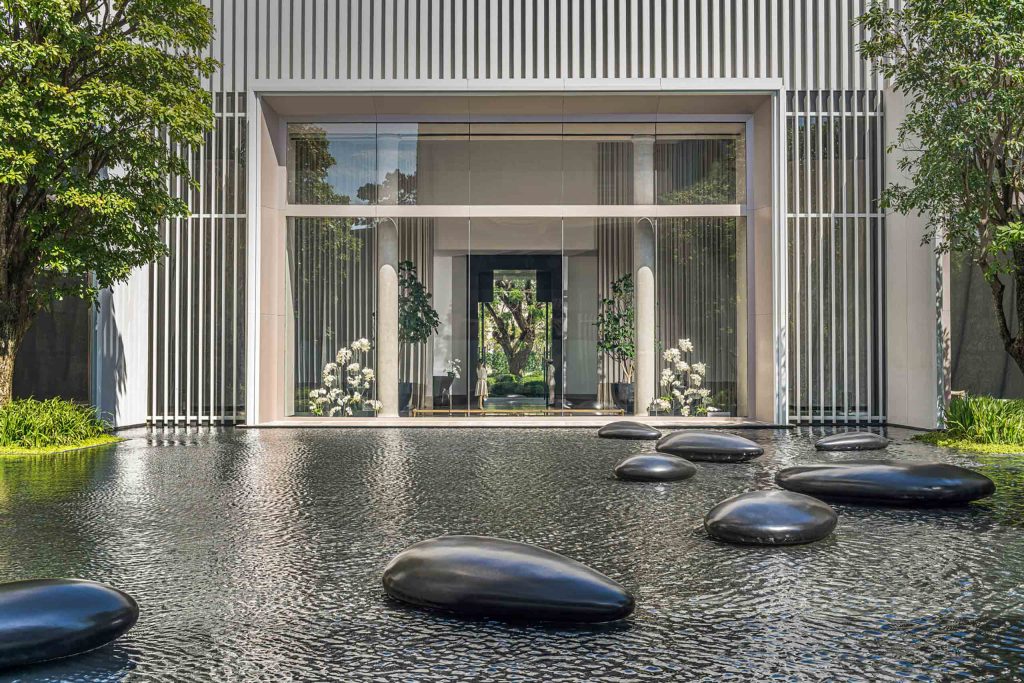

Culture, largely the human response to our immediate environments, is one such benchmark. And many of last night’s winners owe their continued success to their commitment to engaging with local communities and enabling their guests to do the same. At Nice’s Hôtel du Couvent (#27), visitors mingle with the Niçoise at a weekly farmers’ market on the hotel grounds. The property’s owner, Valéry Grégo, also takes pride in having given the former nunnery a new lease of life, gushing to us over a now 93-year-old former nun, who spent much of her life at the convent. “She told me that the holes in the courtyard walls were made by the nuns themselves, calling it their TV. They used to look out and observe the world around them – mostly men, and fashion”.
Stories like this convey a sense of personality over pillow menus, which operate on the exact other end of the emotional pull spectrum. At Chablé Yucatán (#8), which lies just forty minutes southwest of the state capital of Mérida, a similar sentiment turns first-timers into repeat visitors. Co-founder and CEO Diego Gutierrez told us that “60% of our employees are from the region, and we encourage them to express themselves and our unique culture at work”. Following a “back to basics” approach, Chablé also arranges authentic Mayan rituals with shamans and local grandmothers (who fulfil the same purpose within Mayan societies and have direct lineage through family succession, but cannot call themselves shamans due to their gender).
Traditionally, corporate entities have a harder time facilitating meaningful or spontaneous interactions. Too high are the stakes on a brand level, should new initiatives be badly executed, feel contrived, or worse, like a hotel is chasing trends in an effort to remain relevant. Antonio Saponara, General Manager of Capella Bangkok, an urban “retreat for UHNWI” which came in third this year after claiming the top spot in 2024, shared with us that aside from its formidable stance on inclusion (and we would know) alongside facilities that are extraordinary even by the Thai capital’s high standards, what gives the hotel its edge are the touch points with its sociocultural context.
“If you’d like to meditate with the head monk of a local temple, we can arrange it. Or if you’d rather our chef take you out to a market, where you can pick your own produce and have it prepared for you in the house of a Bangkokian, leave it with us. Guests might sit at a table as kids come home from school. It’s a really wonderful experience”, Antonio said.
Not every hotel can arrange cultural immersion quite so elegantly, and when experiences aren’t facilitated with the necessary respect to communities on the ground, there’s a danger of peering into the lives of “ordinary people” that seems Dickensian at best, and exploitative at worst. And there’s no denying that some destinations are at risk of being ruined by their very popularity, not merely for visitors, but more importantly, for locals, too.
In St. Moritz or Mykonos, the waiter pouring your cup of coffee at breakfast might’ve had an extra-early start to travel into a destination whose environs they can no longer afford to live in, while in Mallorca, your tour guide might well spend the season sleeping in a van. We’re not meeting trouble halfway here. In fact, during a recent holiday, we commented on how cheap the fare of a local ferry was in front of a luxury hotel employee, who smiled at us and replied, “yes… for you”. A stark reminder of our privilege.
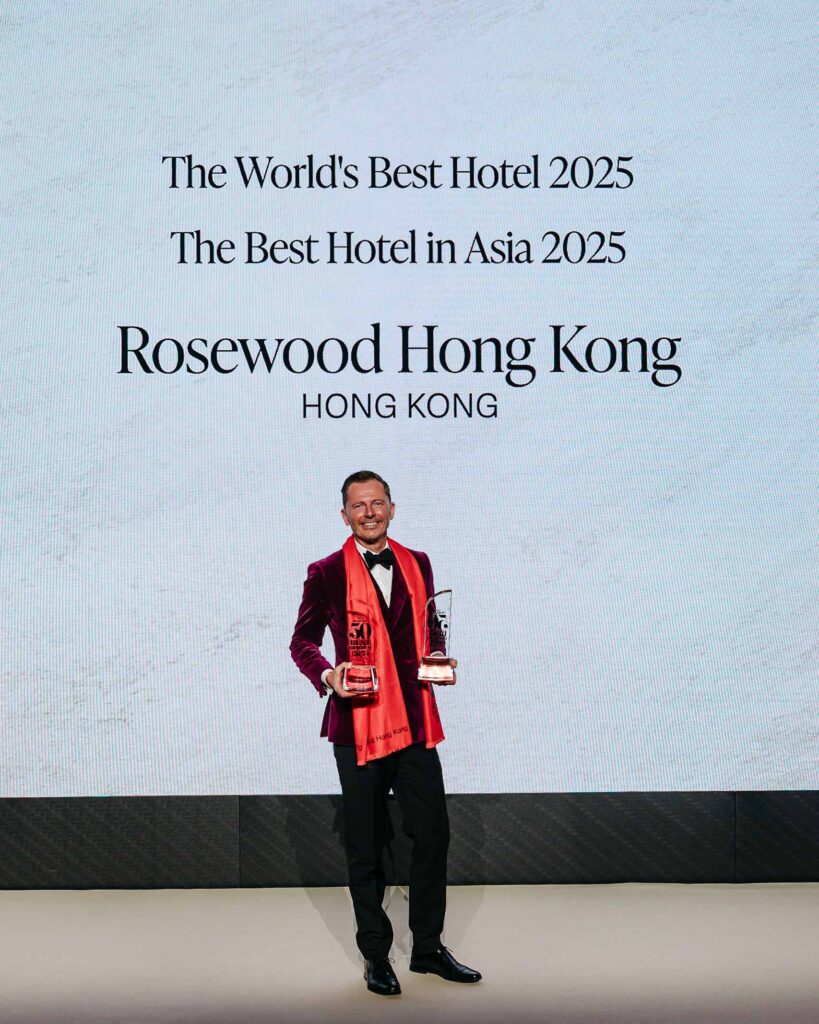

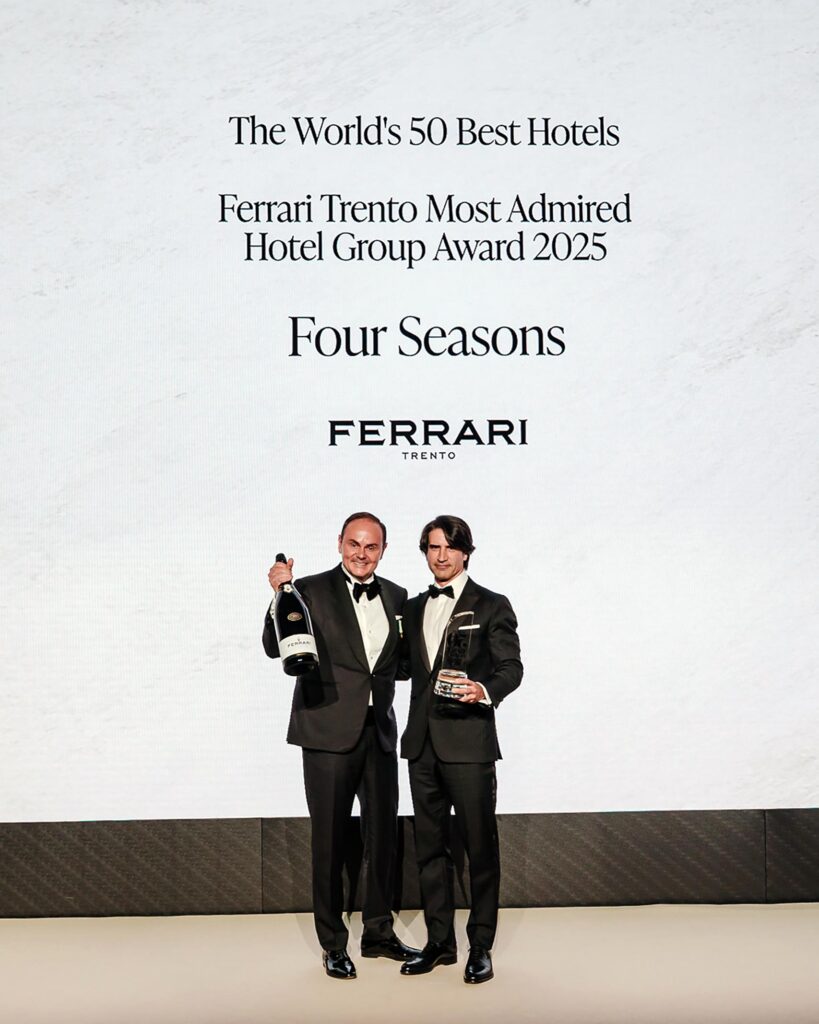
That dialogue and time spent with locals can take place on a more level basis, too, is something we’ve experienced first-hand while getting to know our Raffles butlers across the brand’s portfolio. At flagship Raffles Singapore (#5), butlers aren’t simply there to execute requests. Instead, Managing Director Christian Westbeld told us, they are “curators of the city, who hold keys to its most exclusive spaces and events”. It’s a move towards a more creative and active role that encourages individualism and expression of tastes, allowing butlers to make personal recommendations when it comes to experiences – something paid tribute to in the brand’s ‘The Butler Did It’ campaign, which launched to industry acclaim in 2024.
Experiences, on a wider note, are also taking over destinations in how travellers decide where to visit, and one company that understands this is luxury tour operator Scott Dunn, which sells many of the 50 Best. Jules Maury, Head of Scott Dunn Private, the brand’s invite-only membership service for UHNWI, recently told us, “When it comes to UHNW travellers, there really are no distinct trends in terms of the destinations they visit; however, our members are increasingly united by one common motivation: a desire to reconnect with their purpose. The 1% are seeking life-changing journeys and we are the conduits, be it pushing boundaries on a guided high mountain trekking expedition through New Zealand or participating as a family in biodiversity restoration projects in Costa Rica”.
An experience-first approach poses a challenge to hotels everywhere that no celebrity chefs or spa partnerships can compensate for. That’s because when the very experience of visiting becomes unenjoyable as a result of overtourism, degradation of the natural environment, or commercialisation of local culture, travellers have no small amount of alternative experiences to choose from elsewhere. The simple fact of the matter is that, regardless of how good a hotel might be, no place to stay exists outside of its wider cultural and socioeconomic context, and therefore, hotels are only ever as good as the destinations they’re in, and the potential for experience-driven tourism they offer.
In this regard, The World’s 50 Best Hotels 2025 are arguably a testament to the destinations they owe their success to, although the loose criteria behind its voting process are only so representative of the realities on the ground. What makes a good hotel is highly subjective, of course. To us, a lot comes down to a hotel’s capability to create a bespoke experience for guests who don’t fit the mould. As vegans, we routinely see our dietary requirements catered to in lacklustre and borderline offensive ways (“Do you drink normal milk?”) that are representative of many hotels’ bias and a total lack of willingness to learn. It’s something we’ve personally witnessed even at a number of properties within the 50 Best, which pride themselves on Michelin stars that mean precious little to us and fellow guests with dietary requirements that aren’t taken seriously – at the end of the day, you can’t eat the star.
That’s not to discredit hotels or the list itself. Does the latter read like the result of an AI prompt based on last year’s winners? A little. Is the balance between corporate brands and independent hotels skewed? You know it. But The World’s 50 Best Hotels 2025 gives some valuable insight into what guests appreciate about the places they choose to bed down at, and it would be wrong not to acknowledge that few industries are as fervently scrutinised as the hotel business. One thing is certain: each hotel honoured at last night’s ceremony is deserving of recognition.
Marie-Louise Sciò, CEO and Creative Director of Il Pellicano Hotels, whose Porto Ercole property Hotel Il Pellicano came in at #26, told us that the group “avoids clichés and trends”, and was instead intent on “bringing back the art of travel, of not knowing”. In 2025, the world’s actual best hotels are its most cultured. The ones that encourage their guests to get off their phones and into the world around them – good, bad, or “Best”. Chablé’s Diego Gutierrez summed it up perfectly: “At Chablé Yucatán, you’re near Uxmal, Mérida and incredible mangrove forests. Why would you spend all your time at the hotel?”
Photography courtesy of The World’s 50 Best Hotels 2025, the Rosewood Hotel Group, Four Seasons and Capella Hotels and Resorts


